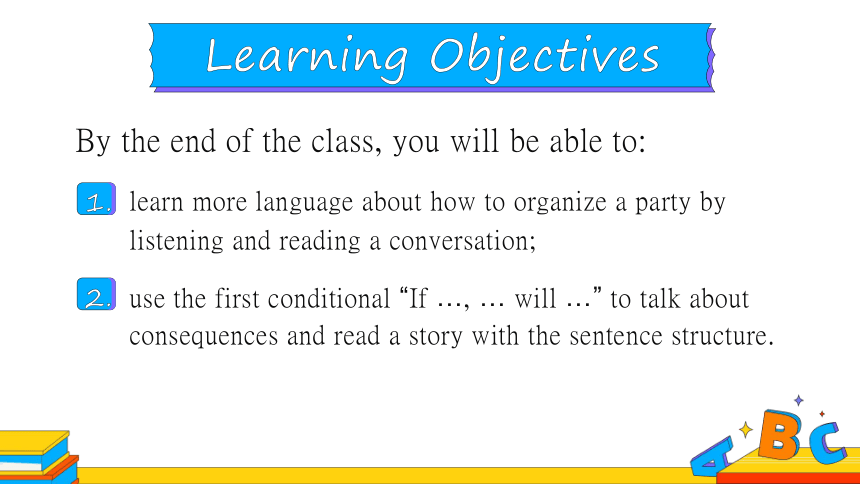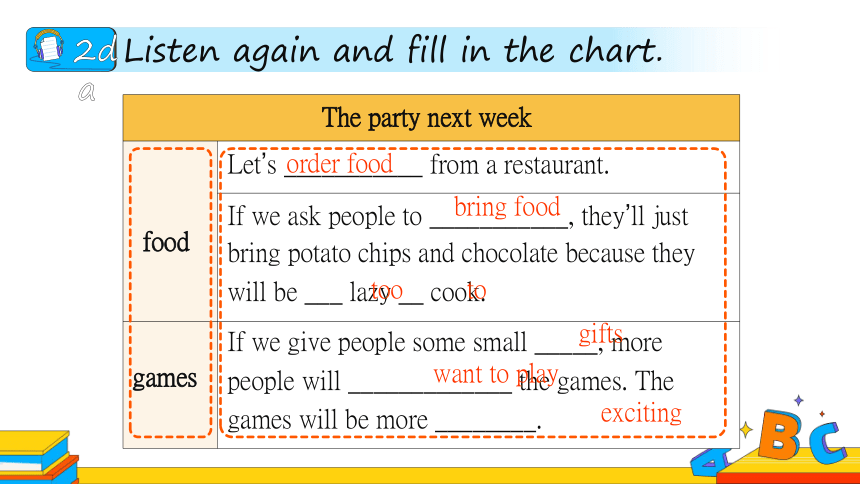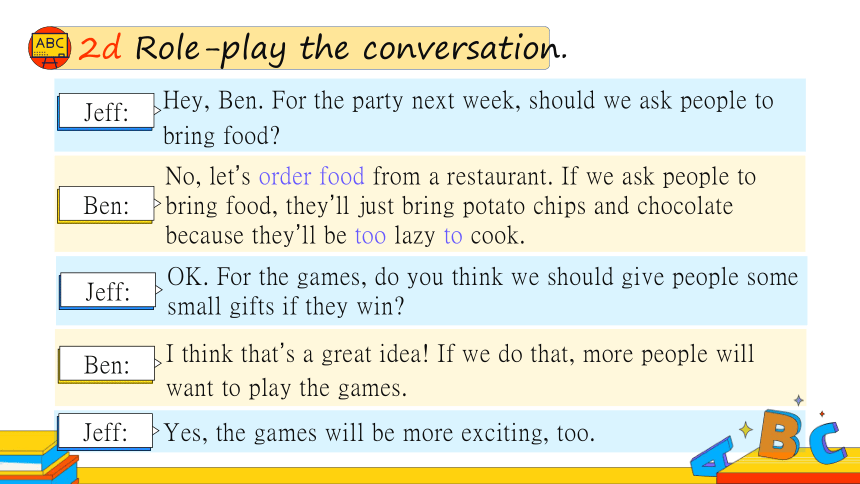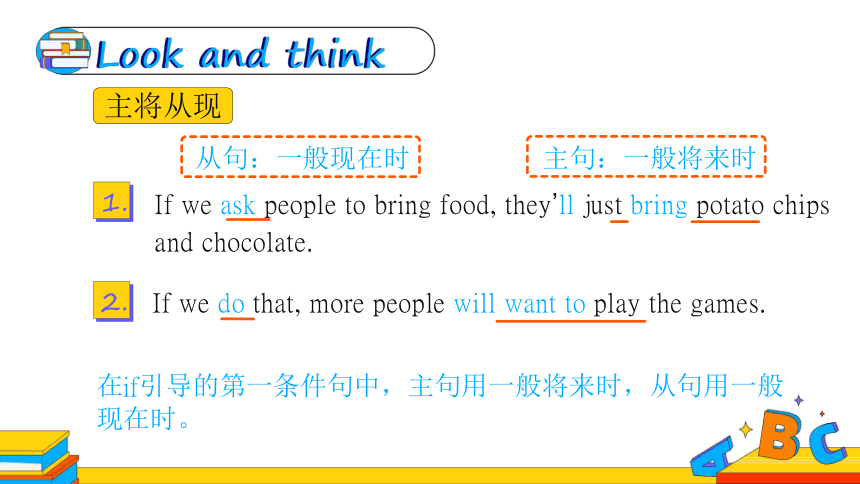Unit 10 If you go to the party, you'll have a great time!Section A (2d-3c)课件(共33张PPT)
文档属性
| 名称 | Unit 10 If you go to the party, you'll have a great time!Section A (2d-3c)课件(共33张PPT) |  | |
| 格式 | pptx | ||
| 文件大小 | 4.1MB | ||
| 资源类型 | 教案 | ||
| 版本资源 | 人教新目标(Go for it)版 | ||
| 科目 | 英语 | ||
| 更新时间 | 2022-12-27 21:09:21 | ||
图片预览












文档简介
(共33张PPT)
If you go to the party, you’ll have a great time!
Period 2
To go to the party, or not to go
Learning Objectives
By the end of the class, you will be able to:
1.
learn more language about how to organize a party by listening and reading a conversation;
2.
use the first conditional “If …, … will …” to talk about consequences and read a story with the sentence structure.
What are the sea animals doing
Party
They are getting ready for a party.
1a
2d
Listen and choose the correct answer.
A
Time and food.
B
Food and games.
C
Clothes and games.
To prepare for the party, what are Jeff and Ben talking about
1a
2d
Listen again and fill in the chart.
The party next week
food
games
Let’s ___________ from a restaurant.
If we ask people to ___________, they’ll just bring potato chips and chocolate because they will be ___ lazy __ cook.
If we give people some small _____, more people will _____________ the games. The games will be more ________.
order food
bring food
too
to
gifts
want to play
exciting
2d Role-play the conversation.
Jeff:
Hey, Ben. For the party next week, should we ask people to bring food
No, let’s order food from a restaurant. If we ask people to bring food, they’ll just bring potato chips and chocolate because they’ll be too lazy to cook.
Ben:
Jeff:
OK. For the games, do you think we should give people some small gifts if they win
Jeff:
Yes, the games will be more exciting, too.
I think that’s a great idea! If we do that, more people will want to play the games.
Ben:
2d Role-play the conversation.
Jeff:
Hey, Ben. For the party next week, should we ask people to bring food
No, let’s order food from a restaurant. If we ask people to bring food, they’ll just bring potato chips and chocolate because they’ll be too lazy to cook.
Ben:
Jeff:
OK. For the games, do you think we should give people some small gifts if they win
Jeff:
Yes, the games will be more exciting, too.
I think that’s a great idea! If we do that, more people will want to play the games.
Ben:
点餐
太……而不……
2d Role-play the conversation.
Jeff:
Hey, Ben. For the party next week, should we ask people to bring food
No, let’s order food from a restaurant. If we ask people to bring food, they’ll just bring potato chips and chocolate because they’ll be too lazy to cook.
Ben:
Jeff:
OK. For the games, do you think we should give people some small gifts if they win
Jeff:
Yes, the games will be more exciting, too.
I think that’s a great idea! If we do that, more people will want to play the games.
Ben:
Look and think
1.
If we ask people to bring food, they’ll just bring potato chips and chocolate.
2.
If we do that, more people will want to play the games.
If引导的第一条件句 (the first conditional) :
If …, … will … : 表示对事情的结果进行预测。
Look and think
1.
If we ask people to bring food, they’ll just bring potato chips and chocolate.
2.
If we do that, more people will want to play the games.
从句:一般现在时
在if引导的第一条件句中,主句用一般将来时,从句用一般现在时。
主句:一般将来时
主将从现
Grammar Focus
I think I’ll take the bus to
the party.
I think I’ll stay at home.
What will happen if they have the party today
Should we ask people to bring food
If you do, you’ll be late.
If you do, you’ll be sorry.
If they have it today, half the class won’t come.
If we ask people to bring food, they’ll just bring potato chips and chocolate.
Grammar Focus
I think I’ll take the bus to
the party.
I think I’ll stay at home.
What will happen if they have the party today
Should we ask people to bring food
If you do, you’ll be late.
If you do, you’ll be sorry.
If they have it today, half the class won’t come.
If we ask people to bring food, they’ll just bring potato chips and chocolate.
Let’s practice! Choose the best answers.
1.
If Mary next Sunday, we’ll go boating together.
2.
The students will plant trees if it tomorrow.
3.
Will you help your mother if she you
4.
If you want to learn English well, you use it as much as possible.
A. will come
B. comes
C. shall come
D. should come
A. rain
B. rains
C. doesn’t rain
D. won’t rain
A. need
B. needs
C. will need
D. would need
A. would
B. need
C. will
D. should
Look at the picture. Can you make a sentence with “If …, … will …”
If I help people, I will feel happy.
If it rains, the frog will be happy and sing.
Look at the picture. Can you make a sentence with “If …, … will …”
If he watches too much TV, his parents won’t be happy.
Look at the picture. Can you make a sentence with “If …, … will …”
If you work hard, you will do well in the exam.
Look at the picture. Can you make a sentence with “If …, … will …”
I don’t (know) what to (do) about going to Mike’s birthday party tomorrow night. My parents (think) I should study for my English exam next week. If I (go) to the party, they (be) upset. Mike (tell) us to wear nice clothes, but I don’t (have) any. If I (wear) jeans, I (look) the worst. Also, I’m not sure how to (go) to the party. If I (walk), it (take) me too long. If I (take) a taxi, it (be) too expensive. Can you give me some advice please
3a Fill in the blanks.
Dear Su Mei,
Tina
know
think
go
will be
told
have
wear
will look
go
walk
will take
take
will be
主将从现
do
Read 3a and answer these questions.
1.
Why does Tina write this letter
2.
What are Tina’s worries
3.
Can you give Tina some advice
Read 3a and answer these questions.
1.
Why does Tina write this letter
“I don’t know what to do about going to Mike’s birthday party tomorrow night. My parents think I should study …”
Because she doesn’t know what to do about going to Mike’s birthday party tomorrow night.
Can you give Tina some advice
Tina’s worries
whether to go or not
how to get there
what to wear
What are Tina’s worries
“If you talk to your parents, they will understand and let you go.”
“I think casual clothes are fine. People won’t judge you by your clothes.”
“If you take the bus, it won’t take too long. It is not expensive either.”
3b Complete the sentences using your own ideas.
1. If I get up late tomorrow,
2. If I don’t finish my homework,
3. If I don’t get enough exercise,
4. I will not have enough time to study if
5. I will not make any friends if
3b Some possible answers.
1. If I get up late tomorrow,
2. If I don’t finish my homework,
3. If I don’t get enough exercise,
4. I will not have enough time to study if
5. I will not make any friends if
I will be late for school.
I won’t fully understand the knowledge.
I will put on more weight.
I watch too much TV.
I don’t talk to others.
Can you make up a story by using “If …, … will …”
1.
Choose your main characters (人物).
2.
Think about where the story happens.
3.
The story has to be based on at least one theme (主题).
4.
Describe some details (细节) in your story.
5.
Try to think of an unexpected ending (结局).
Let’s read a story — The Dreamy Milkmaid.
Once upon a time, there was a country girl. One morning, she went out as usual to milk her cow. When she finished, she picked up the pot of milk and began to walk back to the farmhouse. As she walked, she started daydreaming.
“If I make cream and butter out of milk, I can sell it,” she thought. “If l can sell the cream and butter, I will buy some eggs.”
Let’s read a story — The Dreamy Milkmaid.
As she walked along, she became more excited. “If my eggs hatch (孵化), then I will start a chicken farm. Then if I have a chicken farm, I can sell some of the chickens. If I can sell enough chickens, I will buy a beautiful dress.”
Let’s read a story — The Dreamy Milkmaid.
Lost in her dreams, she began to walk more quickly and swing her arms. “If I buy a beautiful dress, all the boys will admire (仰慕) me. But if any of them ask me to dance, I will just turn away!”
Let’s read a story — The Dreamy Milkmaid.
空中楼阁, 做白日梦
As she imagined all the boys admiring her, she swung her arms out wide and turned around. The pot of milk flew out of her hand and all the milk spilled out. “Oh, no!” She cried. “I shouldn’t build castles in the air!”
Let’s read a story — The Dreamy Milkmaid.
Summary
In today’s lesson,
we learned more language about how to organize a party;
1.
we learned how to use the first conditional to talk about consequences;
2.
we read a story with the first conditional “If …, … will …”.
3.
Homework
Please make up a story with the first conditional “If …, … will …” and then read the story to your parents. Here is a beginning which you may use.
【供参考的故事开头】:
I think I will go to the movies tonight. If …
Goodbye!
If you go to the party, you’ll have a great time!
Period 2
To go to the party, or not to go
Learning Objectives
By the end of the class, you will be able to:
1.
learn more language about how to organize a party by listening and reading a conversation;
2.
use the first conditional “If …, … will …” to talk about consequences and read a story with the sentence structure.
What are the sea animals doing
Party
They are getting ready for a party.
1a
2d
Listen and choose the correct answer.
A
Time and food.
B
Food and games.
C
Clothes and games.
To prepare for the party, what are Jeff and Ben talking about
1a
2d
Listen again and fill in the chart.
The party next week
food
games
Let’s ___________ from a restaurant.
If we ask people to ___________, they’ll just bring potato chips and chocolate because they will be ___ lazy __ cook.
If we give people some small _____, more people will _____________ the games. The games will be more ________.
order food
bring food
too
to
gifts
want to play
exciting
2d Role-play the conversation.
Jeff:
Hey, Ben. For the party next week, should we ask people to bring food
No, let’s order food from a restaurant. If we ask people to bring food, they’ll just bring potato chips and chocolate because they’ll be too lazy to cook.
Ben:
Jeff:
OK. For the games, do you think we should give people some small gifts if they win
Jeff:
Yes, the games will be more exciting, too.
I think that’s a great idea! If we do that, more people will want to play the games.
Ben:
2d Role-play the conversation.
Jeff:
Hey, Ben. For the party next week, should we ask people to bring food
No, let’s order food from a restaurant. If we ask people to bring food, they’ll just bring potato chips and chocolate because they’ll be too lazy to cook.
Ben:
Jeff:
OK. For the games, do you think we should give people some small gifts if they win
Jeff:
Yes, the games will be more exciting, too.
I think that’s a great idea! If we do that, more people will want to play the games.
Ben:
点餐
太……而不……
2d Role-play the conversation.
Jeff:
Hey, Ben. For the party next week, should we ask people to bring food
No, let’s order food from a restaurant. If we ask people to bring food, they’ll just bring potato chips and chocolate because they’ll be too lazy to cook.
Ben:
Jeff:
OK. For the games, do you think we should give people some small gifts if they win
Jeff:
Yes, the games will be more exciting, too.
I think that’s a great idea! If we do that, more people will want to play the games.
Ben:
Look and think
1.
If we ask people to bring food, they’ll just bring potato chips and chocolate.
2.
If we do that, more people will want to play the games.
If引导的第一条件句 (the first conditional) :
If …, … will … : 表示对事情的结果进行预测。
Look and think
1.
If we ask people to bring food, they’ll just bring potato chips and chocolate.
2.
If we do that, more people will want to play the games.
从句:一般现在时
在if引导的第一条件句中,主句用一般将来时,从句用一般现在时。
主句:一般将来时
主将从现
Grammar Focus
I think I’ll take the bus to
the party.
I think I’ll stay at home.
What will happen if they have the party today
Should we ask people to bring food
If you do, you’ll be late.
If you do, you’ll be sorry.
If they have it today, half the class won’t come.
If we ask people to bring food, they’ll just bring potato chips and chocolate.
Grammar Focus
I think I’ll take the bus to
the party.
I think I’ll stay at home.
What will happen if they have the party today
Should we ask people to bring food
If you do, you’ll be late.
If you do, you’ll be sorry.
If they have it today, half the class won’t come.
If we ask people to bring food, they’ll just bring potato chips and chocolate.
Let’s practice! Choose the best answers.
1.
If Mary next Sunday, we’ll go boating together.
2.
The students will plant trees if it tomorrow.
3.
Will you help your mother if she you
4.
If you want to learn English well, you use it as much as possible.
A. will come
B. comes
C. shall come
D. should come
A. rain
B. rains
C. doesn’t rain
D. won’t rain
A. need
B. needs
C. will need
D. would need
A. would
B. need
C. will
D. should
Look at the picture. Can you make a sentence with “If …, … will …”
If I help people, I will feel happy.
If it rains, the frog will be happy and sing.
Look at the picture. Can you make a sentence with “If …, … will …”
If he watches too much TV, his parents won’t be happy.
Look at the picture. Can you make a sentence with “If …, … will …”
If you work hard, you will do well in the exam.
Look at the picture. Can you make a sentence with “If …, … will …”
I don’t (know) what to (do) about going to Mike’s birthday party tomorrow night. My parents (think) I should study for my English exam next week. If I (go) to the party, they (be) upset. Mike (tell) us to wear nice clothes, but I don’t (have) any. If I (wear) jeans, I (look) the worst. Also, I’m not sure how to (go) to the party. If I (walk), it (take) me too long. If I (take) a taxi, it (be) too expensive. Can you give me some advice please
3a Fill in the blanks.
Dear Su Mei,
Tina
know
think
go
will be
told
have
wear
will look
go
walk
will take
take
will be
主将从现
do
Read 3a and answer these questions.
1.
Why does Tina write this letter
2.
What are Tina’s worries
3.
Can you give Tina some advice
Read 3a and answer these questions.
1.
Why does Tina write this letter
“I don’t know what to do about going to Mike’s birthday party tomorrow night. My parents think I should study …”
Because she doesn’t know what to do about going to Mike’s birthday party tomorrow night.
Can you give Tina some advice
Tina’s worries
whether to go or not
how to get there
what to wear
What are Tina’s worries
“If you talk to your parents, they will understand and let you go.”
“I think casual clothes are fine. People won’t judge you by your clothes.”
“If you take the bus, it won’t take too long. It is not expensive either.”
3b Complete the sentences using your own ideas.
1. If I get up late tomorrow,
2. If I don’t finish my homework,
3. If I don’t get enough exercise,
4. I will not have enough time to study if
5. I will not make any friends if
3b Some possible answers.
1. If I get up late tomorrow,
2. If I don’t finish my homework,
3. If I don’t get enough exercise,
4. I will not have enough time to study if
5. I will not make any friends if
I will be late for school.
I won’t fully understand the knowledge.
I will put on more weight.
I watch too much TV.
I don’t talk to others.
Can you make up a story by using “If …, … will …”
1.
Choose your main characters (人物).
2.
Think about where the story happens.
3.
The story has to be based on at least one theme (主题).
4.
Describe some details (细节) in your story.
5.
Try to think of an unexpected ending (结局).
Let’s read a story — The Dreamy Milkmaid.
Once upon a time, there was a country girl. One morning, she went out as usual to milk her cow. When she finished, she picked up the pot of milk and began to walk back to the farmhouse. As she walked, she started daydreaming.
“If I make cream and butter out of milk, I can sell it,” she thought. “If l can sell the cream and butter, I will buy some eggs.”
Let’s read a story — The Dreamy Milkmaid.
As she walked along, she became more excited. “If my eggs hatch (孵化), then I will start a chicken farm. Then if I have a chicken farm, I can sell some of the chickens. If I can sell enough chickens, I will buy a beautiful dress.”
Let’s read a story — The Dreamy Milkmaid.
Lost in her dreams, she began to walk more quickly and swing her arms. “If I buy a beautiful dress, all the boys will admire (仰慕) me. But if any of them ask me to dance, I will just turn away!”
Let’s read a story — The Dreamy Milkmaid.
空中楼阁, 做白日梦
As she imagined all the boys admiring her, she swung her arms out wide and turned around. The pot of milk flew out of her hand and all the milk spilled out. “Oh, no!” She cried. “I shouldn’t build castles in the air!”
Let’s read a story — The Dreamy Milkmaid.
Summary
In today’s lesson,
we learned more language about how to organize a party;
1.
we learned how to use the first conditional to talk about consequences;
2.
we read a story with the first conditional “If …, … will …”.
3.
Homework
Please make up a story with the first conditional “If …, … will …” and then read the story to your parents. Here is a beginning which you may use.
【供参考的故事开头】:
I think I will go to the movies tonight. If …
Goodbye!
同课章节目录
- Unit 1 Where did you go on vacation?
- Section A
- Section B
- Unit 2 How often do you exercise?
- Section A
- Section B
- Unit 3 I'm more outgoing than my sister.
- Section A
- Section B
- Unit 4 What's the best movie theater?
- Section A
- Section B
- Unit 5 Do you want to watch a game show?
- Section A
- Section B
- Unit 6 I'm going to study computer science.
- Section A
- Section B
- Unit 7 Will people have robots?
- Section A
- Section B
- Unit 8 How do you make a banana milk shake?
- Section A
- Section B
- Unit 9 Can you come to my party?
- Section A
- Section B
- Unit 10 If you go to the party, you'll have a grea
- Section A
- Section B
